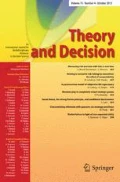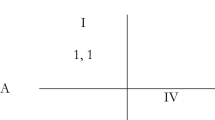Abstract
In a democracy, the views and wishes of the citizens are to count. The problem here is how this dictum is to be understood. I suggest that a proper analysis requires that each person's preferences be seen in the context of his beliefs concerning the preferences of the others and of the preferences he would have if he held different beliefs. Preferences founded on erroneous beliefs call for special consideration. So also do certain reluctantly held preferences. I propose a decision-policy involving the identification of social equilibria of preference.
Similar content being viewed by others
Bibliography
K. J. Arrow, ‘Public and Private Values’, in Human Values and Economic Policy (ed. by Sidney Hook), New York 1967.
K. J. Arrow, Social Choice and Individual Values, 2nd ed., New York 1963.
D. Black, The Theory of Committees and Elections, Cambridge 1958.
J. M. Buchanan, and William C. Stubblebine, ‘Externality’, Economica 29 (1962) 371–84.
R. Farquharson, Theory of Voting, Oxford 1969.
P. Fishburn, ‘Should Social Choice be Based on Binary Comparisons?’ forth-coming in Journal of Mathematical Sociology.
B. Hansson, ‘Arrow's Proof and Different Kinds of Dictators’, forthcoming in Philosophy of Science.
B. Hansson, ‘Group Preferences’, Econometrica 37 (1969) 50–54.
B. Hansson, ‘Voting and Group Decision Functions’, Synthese 20 (1969) 526–37.
J. C. Harsanyi, ‘Cardinal Welfare, Individualistic Ethics, and Interpersonal Comparisons of Utility’, Journal of Political Economy 63 (1955) 309–21.
C. Hildreth, ‘Alternate Conditions for Social Orderings’, Econometrics 21 (1953) 81–94.
C. E. Lindblom, The Intelligence of Democracy, New York 1965.
A. D. Lindsay, The Essentials of Democracy, 2nd ed., Oxford 1935.
Y. Murakami, Logic and Social Choice, London 1968.
P. K. Pattanaik, ‘A Note on Democratic Decisions and the Existence of Choice Sets’, Review of Economic Studies 35 (1968) 1–9.
D. Riesman, The Lonely Crowd, New Haven 1950.
W. H. Riker, ‘The Paradox of Voting and Congressional Rules for Voting on Amendments’, American Political Science Review 52 (1958) 349–66.
F. Schick, ‘Arrow's Proof and the Logic of Preference’, Philosophy of Science 36 (1969) 127–44.
A. K. Sen, ‘A Possibility Theorem on Majority Decisions’, Econometrica 34 (1966) 491–99.
T. Veblen, The Theory of the Leisure Class, New York 1899.
G. H. von Wright, The Logic of Preference, Edinburgh 1963.
Author information
Authors and Affiliations
Rights and permissions
About this article
Cite this article
Schick, F. Democracy and interdependent preferences. Theor Decis 3, 55–75 (1972). https://doi.org/10.1007/BF00139354
Issue Date:
DOI: https://doi.org/10.1007/BF00139354




